The following documents and other resources examine the Carter administration’s efforts to resolve the Arab-Israeli conflict. Partial success culminated with Israeli Prime Minister Menachem Begin and Egyptian President Anwar Sadat signing the Camp David Accords in 1978 and the Egyptian-Israeli Peace Treaty in 1979. The documents are drawn from published and unpublished items housed in the Israeli State Archives, the Carter Presidential Library and the Foreign Relations of the United States, supplemented by interviews, analyses, videos and more.

June 2025 CIE has compiled the following list of books and articles, including some available on our website, to guide understanding of Israel’s capital, the holy city of Jerusalem. Books Adelman, Madelaine, and Miriam Fendius…
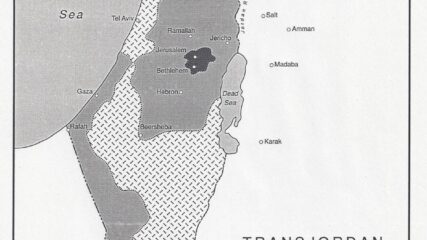
Ken Stein, President, Center for Israel Education, May 19, 2025 Introduction Since 1937, the idea of geopolitically separating Jewish and Arab populations west of the Jordan River has been a recommended solution to mitigate violence between…

Kenneth W. Stein, “Evolving a Diplomatic Legacy From the October War: The US, Egyptian, and Israeli Triangle,” in Asaf Siniver (ed.), The October 1973 War Politics, Diplomacy, and Legacy, London: Hurst and Company, 2013. This…

January 9, 2025 Dan Senor, co-author of The Genius of Israel and Start-Up Nation, brought Center for Israel Education President Ken Stein on his Call Me Back podcast on Jan. 9 just hours after the…

Professor Ken Stein spent decades working with and researching the presidency and post-presidency of Jimmy Carter and shared many of his insights with the media and fellow scholars after the 39th U.S. president died Dec….

January 9, 2025 Ken Stein on “Scott Slade’s Georgia” on WSB radio to discuss Jimmy Carter on Jan. 9, 2025. WSB radio veteran Scott Slade interviewed CIE President Ken Stein about President Jimmy Carter and…

January 6, 2025 CIE President Ken Stein addressed “Jimmy Carter’s Middle East Legacies” during a webinar hosted by Scholars for Peace in the Middle East in cooperation with the Association for the Study of the…

January 6, 2025 CIE President Ken Stein is interviewed about Jimmy Carter by Foundation for Defense of Democracies Executive Director Jonathan Schanzer on the “FDD Morning Brief” on January 6, 2025. Jonathan Schanzer: It’s now…

By Ken Stein, October 28, 2024 When Georgia Governor Jimmy Carter became the 39th President of the United States in 1977, he had little foreign policy experience, particularly regarding the Arab-Israeli conflict. Despite this, he…
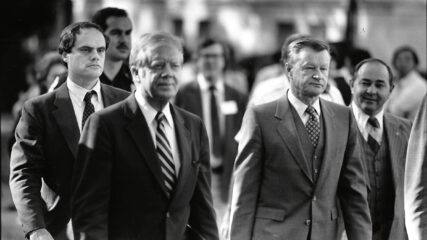
September 2024 By Kenneth Stein Kenneth Stein is Emeritus Professor of Contemporary Middle Eastern History, Political Science and Israel Studies at Emory University and President of the Atlanta-based Center for Israel Education. He is the author…
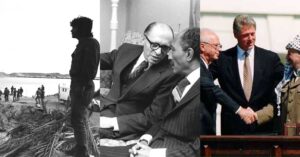
Unfold six Arab states’ embrace of Israel since 1973 out of national interests and U.S. mediation, sidelining the Palestinian movement, and explore Hamas’ Oct. 7, 2023, attack and its implications for the Israeli-Palestinian conflict and Israeli diplomacy.
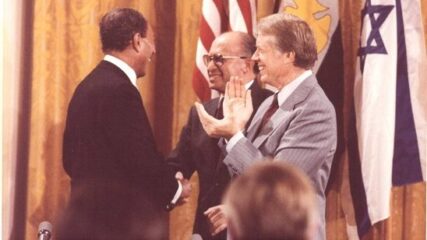
It is now apparent that distances between the Carter administration and Israel did not begin in earnest after Begin’s May 1977 election or over the settlements. Newly available materials show that from its outset, the Carter administration prioritized curbing Israeli influence in Washington.
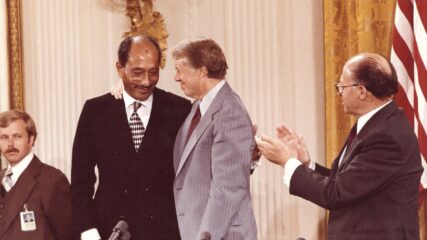
The Camp David accords culminated after thirteen days of intense negotiations between Israeli, Egyptian, and American delegations. Egyptian and Israeli leaders met with President Carter where after difficult negotiations they signed two accords, one an outline for an Egyptian-Israeli Treaty and one for Palestinian self-rule. The negotiations continued for another six months until the Egyptian-Treaty was signed in March 1979, after considerable bad feeling was tossed back and forth between Israeli and American negotiators.
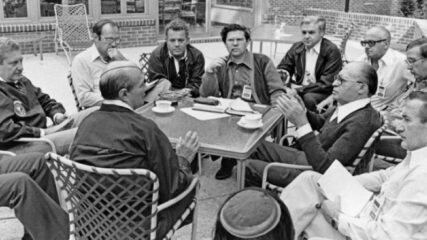
Introduction With an extraordinary legaI mind and life of civil service to the state of Israel, Rubinstein served as an estimable Supreme Court Judge, as legal adviser during the Egyptian -Israeli negotiations, worked closely with…

Working in the Defense Department, with the National Security Council or in the State Department under every president from Jimmy Carter to Barack Obama, Ross helped shape U.S. Middle East policy. He helped get Israel…

Sadat was elevated from Egypt’s vice president to president after Gamal Abdel Nasser died in 1970. With Syria, he launched the October 1973 war against Israel. He flew to Israel four years later in pursuit…

Avineri, a native of Poland, was one of Israel’s premier political scientists as a Hebrew University professor and wrote extensively on the history of political philosophy, including Marx, Engels, Hegel, Zionism, colonialism and the Soviet…

On a stormy evening on Sept. 17, 1978, with President Jimmy Carter as their witness, Egyptian President Anwar Sadat and Israeli Prime Minister Menachem Begin stepped to a table at the White House and signed the Camp David Accords, consisting of two framework agreements: an outline for the Egyptian-Israeli Peace Treaty and a scaffold for planning self-rule for the Palestinians living in the West Bank and Gaza Strip, held by Israel since the June 1967 war. Six months later, on March 26, 1979, the three men gathered again at the White House to sign the peace treaty. But their path to the ceremony 40 years ago was hardly smooth.

Lithuania-born Barak was a 28-year Supreme Court justice who served as the president of the court from 1995 to 2006. He lifted restrictions on individual petitions to the court and strengthened the judiciary’s authority to…
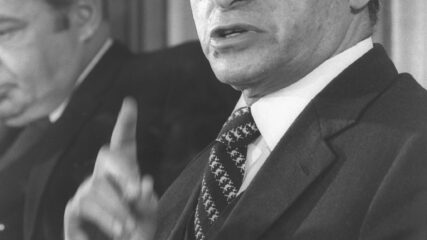
Born in Belarus, Begin joined the Revisionist Betar movement and escaped Nazis and Soviets to reach Palestine. He led the Irgun, then spent three decades in the political opposition, including arguing against German reparations. In…

Weizman, the nephew of Chaim Weizmann, was Israel’s seventh president from 1993 to 2000. He was a founder of the Israeli Air Force and became its commander in 1958. As defense minister in the first…
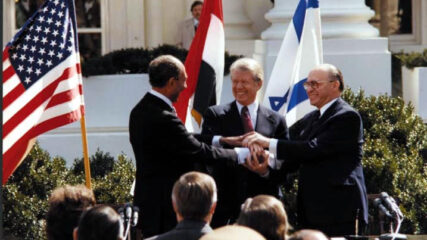
March 26, 2025 By Ken Stein The ripe conditions that prefaced the 1979 Egyptian-Israeli treaty and might presage additional Arab-Israeli agreements are almost totally absent in 2025. Why? Today, there is an absence of political…
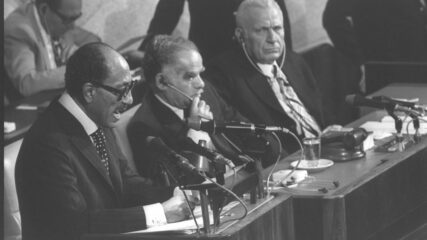
November 25, 2020 By Ken Stein Leadership is about knowing your objectives and adjusting and implementing the tactics to accomplish them. Leadership is also about choices and consequences. It is about making political trade-offs. November…

This documentary source collection is unique because it first and foremost includes materials not provided by the Foreign Relations documents of the United States, particularly items translated to English from Israeli/Hebrew sources. American-centric written materials on the Camp David negotiations crush Israel with unforgiving intransigence. The materials here—when compared to American memoirs—give a broader picture of what unfolded before, during, and after the Camp David negotiations in September 1978. Of particular value in this collection are the regular Israeli delegation meetings where tactics were revised to meet American pressures, but Israel’s strategic outlooks on no Palestinian state, no self-determination, no foreign sovereignty over the West Bank (Judea and Samaria) and no permanent halt to settlements remained constant. There are no known full American made transcripts of any meetings held during the Camp David accords. From the American participants, there are partial diaries of selected meetings, sometimes self-serving memoirs, and personal notes that have been used to shape the writing and interpretations of the Camp David negotiations. Accordingly, a pro-Carter administration outlook about the accords has evolved, with the exception of memoirs published by Israelis who were Camp David participants, and one excellent book, Year of the Dove, 1979
























